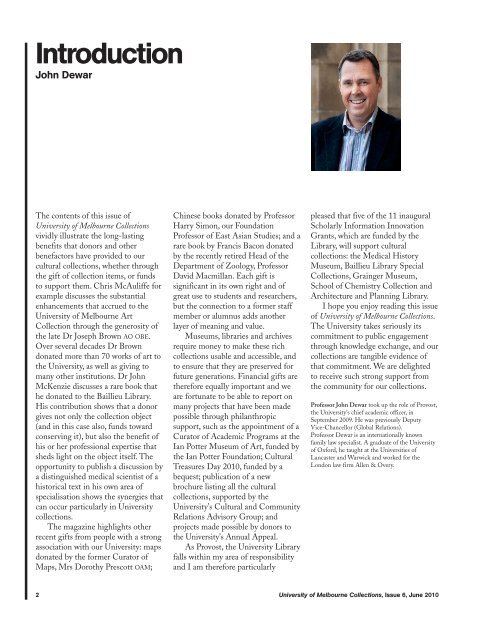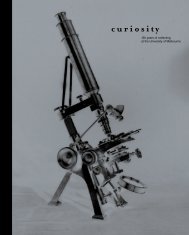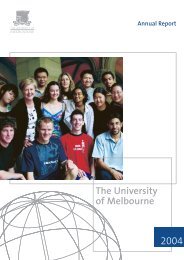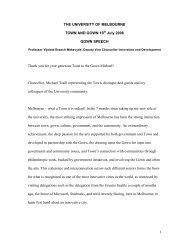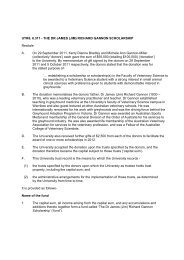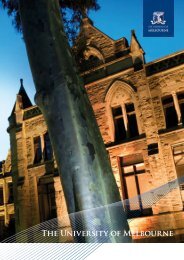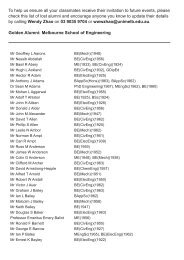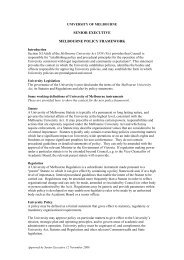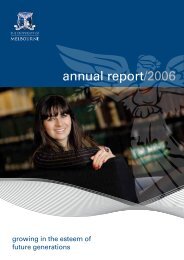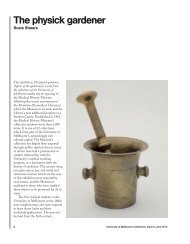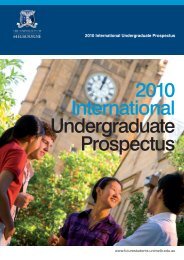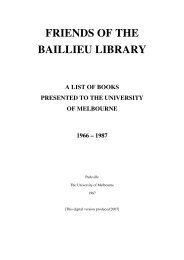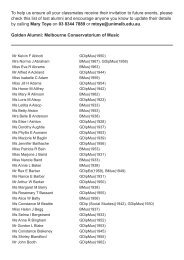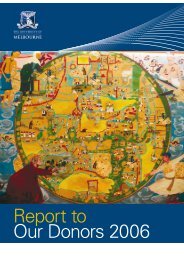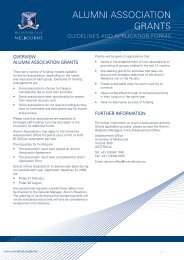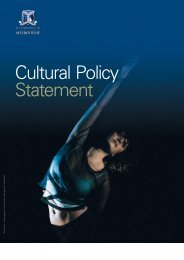COLLECTIONS - University of Melbourne
COLLECTIONS - University of Melbourne
COLLECTIONS - University of Melbourne
Create successful ePaper yourself
Turn your PDF publications into a flip-book with our unique Google optimized e-Paper software.
Introduction<br />
John Dewar<br />
The contents <strong>of</strong> this issue <strong>of</strong><br />
<strong>University</strong> <strong>of</strong> <strong>Melbourne</strong> Collections<br />
vividly illustrate the long-lasting<br />
benefits that donors and other<br />
benefactors have provided to our<br />
cultural collections, whether through<br />
the gift <strong>of</strong> collection items, or funds<br />
to support them. Chris McAuliffe for<br />
example discusses the substantial<br />
enhancements that accrued to the<br />
<strong>University</strong> <strong>of</strong> <strong>Melbourne</strong> Art<br />
Collection through the generosity <strong>of</strong><br />
the late Dr Joseph Brown AO OBE.<br />
Over several decades Dr Brown<br />
donated more than 70 works <strong>of</strong> art to<br />
the <strong>University</strong>, as well as giving to<br />
many other institutions. Dr John<br />
McKenzie discusses a rare book that<br />
he donated to the Baillieu Library.<br />
His contribution shows that a donor<br />
gives not only the collection object<br />
(and in this case also, funds toward<br />
conserving it), but also the benefit <strong>of</strong><br />
his or her pr<strong>of</strong>essional expertise that<br />
sheds light on the object itself. The<br />
opportunity to publish a discussion by<br />
a distinguished medical scientist <strong>of</strong> a<br />
historical text in his own area <strong>of</strong><br />
specialisation shows the synergies that<br />
can occur particularly in <strong>University</strong><br />
collections.<br />
The magazine highlights other<br />
recent gifts from people with a strong<br />
association with our <strong>University</strong>: maps<br />
donated by the former Curator <strong>of</strong><br />
Maps, Mrs Dorothy Prescott OAM;<br />
Chinese books donated by Pr<strong>of</strong>essor<br />
Harry Simon, our Foundation<br />
Pr<strong>of</strong>essor <strong>of</strong> East Asian Studies; and a<br />
rare book by Francis Bacon donated<br />
by the recently retired Head <strong>of</strong> the<br />
Department <strong>of</strong> Zoology, Pr<strong>of</strong>essor<br />
David Macmillan. Each gift is<br />
significant in its own right and <strong>of</strong><br />
great use to students and researchers,<br />
but the connection to a former staff<br />
member or alumnus adds another<br />
layer <strong>of</strong> meaning and value.<br />
Museums, libraries and archives<br />
require money to make these rich<br />
collections usable and accessible, and<br />
to ensure that they are preserved for<br />
future generations. Financial gifts are<br />
therefore equally important and we<br />
are fortunate to be able to report on<br />
many projects that have been made<br />
possible through philanthropic<br />
support, such as the appointment <strong>of</strong> a<br />
Curator <strong>of</strong> Academic Programs at the<br />
Ian Potter Museum <strong>of</strong> Art, funded by<br />
the Ian Potter Foundation; Cultural<br />
Treasures Day 2010, funded by a<br />
bequest; publication <strong>of</strong> a new<br />
brochure listing all the cultural<br />
collections, supported by the<br />
<strong>University</strong>’s Cultural and Community<br />
Relations Advisory Group; and<br />
projects made possible by donors to<br />
the <strong>University</strong>’s Annual Appeal.<br />
As Provost, the <strong>University</strong> Library<br />
falls within my area <strong>of</strong> responsibility<br />
and I am therefore particularly<br />
pleased that five <strong>of</strong> the 11 inaugural<br />
Scholarly Information Innovation<br />
Grants, which are funded by the<br />
Library, will support cultural<br />
collections: the Medical History<br />
Museum, Baillieu Library Special<br />
Collections, Grainger Museum,<br />
School <strong>of</strong> Chemistry Collection and<br />
Architecture and Planning Library.<br />
I hope you enjoy reading this issue<br />
<strong>of</strong> <strong>University</strong> <strong>of</strong> <strong>Melbourne</strong> Collections.<br />
The <strong>University</strong> takes seriously its<br />
commitment to public engagement<br />
through knowledge exchange, and our<br />
collections are tangible evidence <strong>of</strong><br />
that commitment. We are delighted<br />
to receive such strong support from<br />
the community for our collections.<br />
Pr<strong>of</strong>essor John Dewar took up the role <strong>of</strong> Provost,<br />
the <strong>University</strong>’s chief academic <strong>of</strong>ficer, in<br />
September 2009. He was previously Deputy<br />
Vice-Chancellor (Global Relations).<br />
Pr<strong>of</strong>essor Dewar is an internationally known<br />
family law specialist. A graduate <strong>of</strong> the <strong>University</strong><br />
<strong>of</strong> Oxford, he taught at the Universities <strong>of</strong><br />
Lancaster and Warwick and worked for the<br />
London law firm Allen & Overy.<br />
2<br />
<strong>University</strong> <strong>of</strong> <strong>Melbourne</strong> Collections, Issue 6, June 2010


